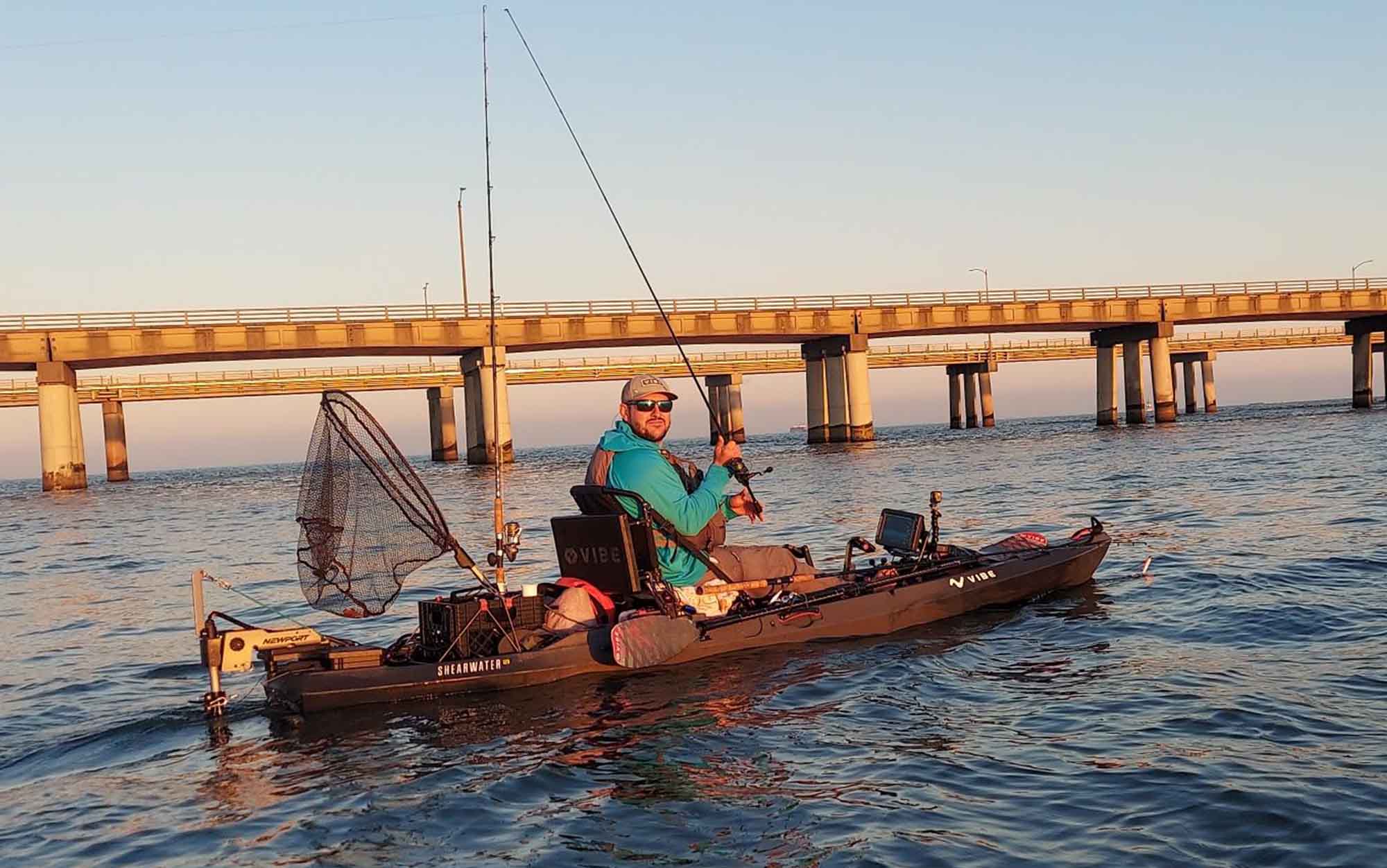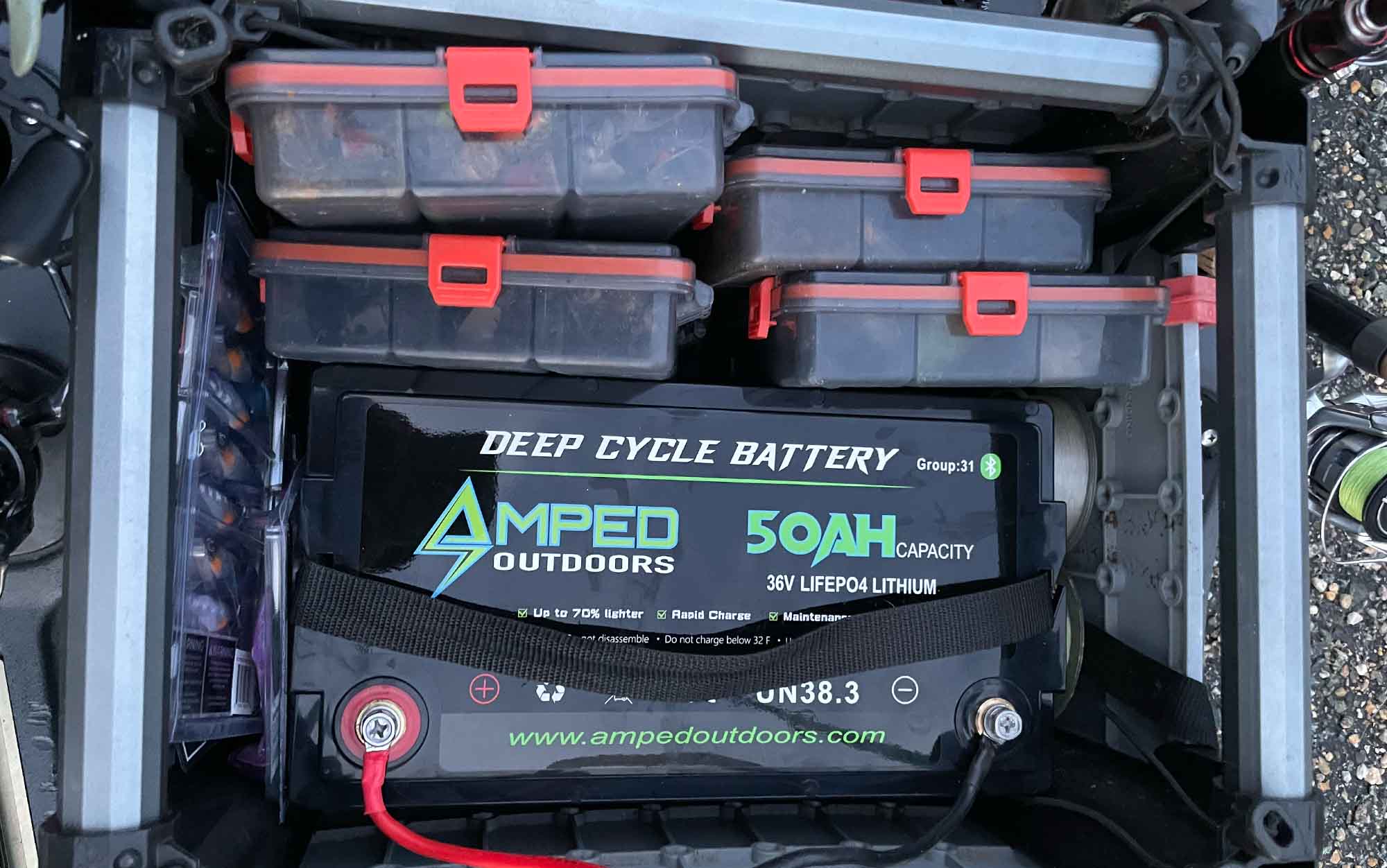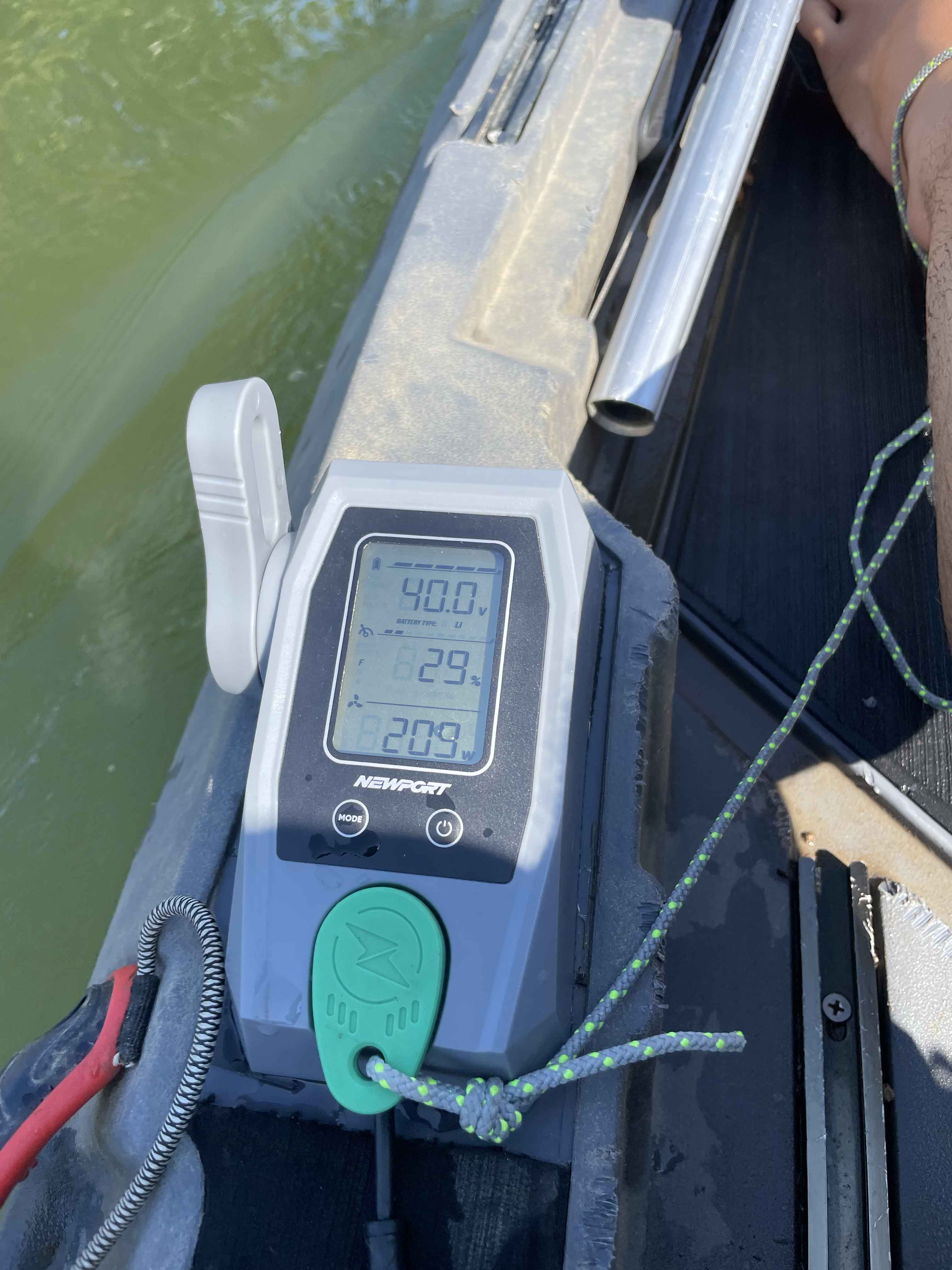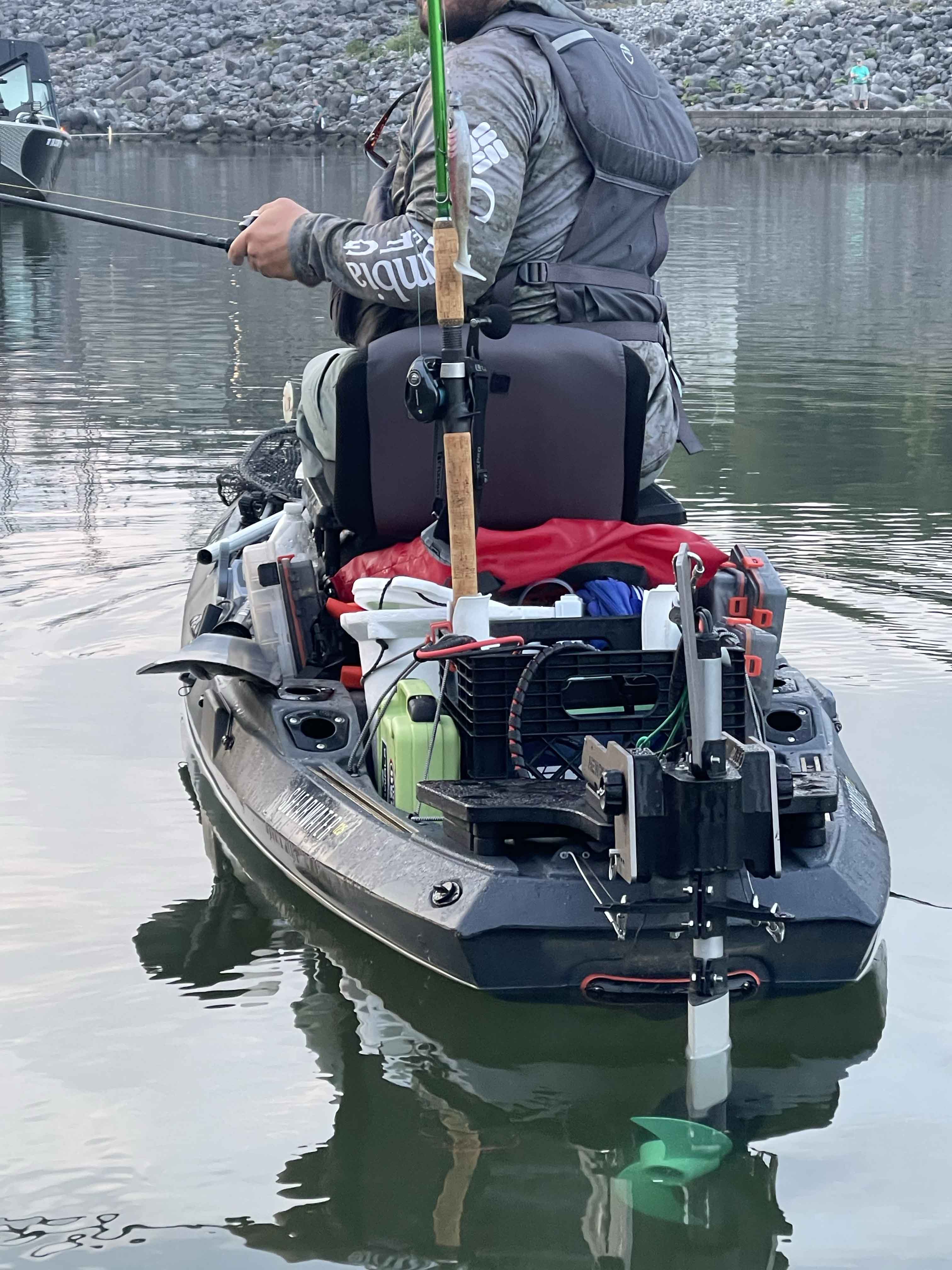We may earn revenue from the products available on this page and participate in affiliate programs. Learn More ›
Motorized kayaks have long been a source of debate in the kayak angling scene. The discussion over adding motors to a small plastic craft can get heated fast, and often centers around one question: How much is too much? The anti-motor crowd typically falls back onto the same talking point, namely “just buy a boat.”
While there’s no doubt that adding a motor can take a large element of kayaking out of kayak fishing, there are some very valid points to be made regarding the safety benefits and long-range capabilities. The reality is that motors are becoming a large part of the kayak fishing world, so I tested a powerful new entry from Newport Vessels. Read my Newport NK300 kayak motor review to find out if its right for you.
Key Features
- 1300W/3 horsepower
- Requires 36V battery
- Top Speed: 6.5mph
- 30 hour runtime
- Lever throttle with digital speed display
- Price: $1,199
Power
With the equivalent of 3hp, this electric motor is as close as you can get to using a gas outboard on a kayak without actually mounting one. Compared to similar kayak motors on the market, the NK300 has exceptional thrust and torque. If you’re looking for a motor with less power, check out their NK180 kayak motor.
Runtime
Newport lists the runtime of the motor to roughly 30 hours, but that’s highly dependent on where you’re using it and the type of battery powering the motor. That said, with the right power source, the NK300 is more than capable of powering you through a full day of fishing in just about any environment you can use a kayak.
Maneuverability
This motor has a triangle steering mount with three separate settings to allow for a more customized turning radius.
Testing the Newport NK300 In the Field

Kevin Hughes
Kayak Compatibility
For this test, I mounted the NK300 to a Vibe Shearwater 125 kayak. This kayak is traditionally powered by a pedal drive system and weighs around 100 pounds fully loaded. With the addition of the NK300 motor with mount system and battery, the weight went up to around 140 pounds. To help offset the added weight, I installed bricks of closed cell foam inside the hull at the fore and aft positions. The foam drastically improved the buoyancy of the craft and allowed for the addition of more electronics and a heavier battery as well.
It’s important to note that the NK300 is not designed to be used on kayaks with a top mounted rudder system, such as the Shearwater 125 and many Old Town angling kayaks. While this is a little frustrating, I was able to find a stern motor mount manufactured by OneObjective Bass Fishing that solved the problem and allowed me to attach the NK300 to my kayak with ease.
Once mounted, I attached the motor to the built-in foot steering system of the Shearwater, allowing me to easily turn the motor with my foot braces. I also connected the motor to my hand steering lever, however the bulk and power of the motor were a little excessive for hand steering, so the foot system was far and away the better option.
Read Next: Best Fishing Kayaks
Battery

Kevin Hughes
A motor can drastically alter the capabilities of your kayak, but at the end of the day it’s only as good as the power source that runs it. The NK300 can run off a standard lead or lithium battery, but it does require 36V to function properly. After testing a few options, I determined the Amped Outdoors 36V 50Ah marine battery was the best option for running the motor properly for an extended period. While other 36V batteries worked, this was the only one that seemed to function as it should every time on the water, and its runtime far exceeded other batteries tested.
Read Next: Best Marine Batteries
Power
For many of my outings, I was accompanied by other kayakers in traditional paddle and foot pedal powered craft. My companions allowed me to compare the benefits and abilities of this motor in a side-by-side scenario to determine just how much the NK300 was benefitting me on a typical fishing trip. The speed and power of the NK300 became almost comically effective at improving my time on the water.
Rather than wasting time paddling from spot to spot, I was able to sit back and rig gear while flying from location to location. In addition to allowing me quicker access to my spots, it also drastically upgraded my fishing range.
Newport claims this motor has top speeds over 6 mph, and I found that to be accurate in testing. While fully loaded, my top speeds were closer to 4.5-5 mph, but with slightly less gear I was able to easily eclipse the 6 mph mark. While the top speeds are impressive, the torque and acceleration of this motor is really what jumps out. The interaction between the motor and the throttle control appears seamless, and its ability to kickstart a 100+ pound watercraft into high speed almost instantaneously is remarkable.
Newport NK300 Maneuverability


When testing this motor, I wanted to get a well-rounded idea of what its capabilities were over the course of a full fishing season. Over the course of six months, I ran this motor through as many different fishing scenarios as I could.
With traditional propulsion methods, you’re limited to how far you feel comfortable paddling or pedaling on any given trip. With the NK300, I found myself more willing to explore new areas. If the fishing was tough, I could easily kick the throttle into gear and find myself several miles away fishing a different zone in no time.
I took this motor into a large variety of different water bodies, both fresh and salt, to see how it performed. It was tested in shallow, rocky rivers and freshwater lakes, large freshwater spillways and rivers, shallow saltwater mud flats and oyster filled creeks, vegetation filled marsh, and deep near-shore and off-shore saltwater scenarios.
While the NK300 offers three settings to customize your turning radius, I found that given the power of the motor, keeping the steering at a looser setting was optimal to prevent turning too suddenly. That said, if your kayak has both foot and handle steering options, you can mount them both to the motor and have two different options for maneuvering.
I found that the foot steering allowed me to have a type of control I’ve never experienced in a kayak before: the ability to utilize the reverse power of the motor to amplify my fishing. Once I got the controls dialed in, I was able to keep my bow pointed downstream in a fast-moving river, while fishing effectively and barely moving. The same was true in saltwater areas with heavy current, such as near bridges. With the slightest touch of my foot I have complete control over my kayak, and I found myself fishing areas with current far more effectively than I ever had.
Runtime
With a standard 36V 30Ah lithium battery I was only able to run out of power one time, fighting heavy current all day long and covering roughly 10 miles. Once I added the 50Ah battery, I found I could run the motor at high speeds all day long and never worry about the battery dying.
Durability
This was far and away the most impressive element of the NK300. When I test gear, I treat it exactly as I would during my normal fishing routine. That means abuse. Mountains of abuse. In the case of the NK300, I ran it directly into and over oyster bars, gravel bars, weed mats, sand bars, concrete, and boulders. Frankly, some of the times I ran it into things, I was mentally prepared for the motor to die.
I treated it in ways that anyone who’s used electric motors would cringe at, and it just kept chugging along. The closest I came to truly killing the motor came this spring, when I ran it onto a large rock formation in a shallow river. I could hear the prop grinding on stone and felt the impact of the motor slamming hard rock, but it kept going all the while. That incident finally resulted in a noticeable impact to the motor, but only slightly, making it a bit louder than before.
Safety
Throughout my testing, there were several times where the wind forecast was drastically wrong, and I found myself having to cover far more water than I anticipated in a far worse chop than expected. Each time, I couldn’t help but think about how bad the situation could have been if not for my ability to kick on the motor and plow through the wind and waves to get home. The same is true of avoiding other watercraft, as I was able to quickly move from the path of oncoming boats.
What the Newport NK300 Does Best

Kevin Hughes
Put simply, this motor absolutely hauls. The exceptional thrust and torque catapults you forward with astounding ease at the slightest push of the throttle. When paired with foot-controlled steering, the NK300’s speed and power dramatically increased my efficiency, range, and maneuverability on the water.
For the size and power of this motor, it’s remarkably quiet. Granted, that’s one of the selling points of any electric motor, but even compared to similar models on the market, the NK300 was easily the quietest. The only motors that have a similar level of silence are also far less powerful, making the NK300 really stand out from the crowd.
I spoke with YouTuber Aliex Folgueira, who specializes in reviewing kayaks and kayak gear, and he estimated he could run the NK300 off a 36v 50ah battery for roughly 40 miles at close to 4 mph. This impressive runtime will keep you on the water as long as you’d like, though I did not have the time or capacity to sit in a moving kayak for two days straight without stopping.
Regardless of your attitude towards motorized kayaks, there’s simply no denying that having a powerful motor can also seriously help you out of some scary situations. Whether it’s unexpected wind, a sudden lightning storm, or other careless boaters on the water, having a motor to get you out of trouble quickly can, quite literally, be a life saver.
Where the Newport NK300 Can Improve
Touchy Throttle
While the power and thrust of the NK300 are absolutely a selling point, there is a downside: I found the throttle control to be touchy and difficult to dial in. The extreme range of speeds this motor is capable of can make controlling it difficult.
The slightest nudge of the throttle can sometimes cause a far more powerful reaction than anticipated, to the point where you can easily get thrown off your boat with too sudden of a push. Wearing a kill switch is always important when operating motorized watercraft, but this is the first kayak motor I’ve used where the prospect of forgetting to wear one is downright terrifying.
From a user perspective, I’d like to see Newport possibly add a power level setting to the throttle to help better standardize the rate of acceleration. As it is, I’d highly recommend a few trial runs with this motor in a controlled environment before taking it out into the open water.
Mounting
The NK300 is not the only kayak motor that Newport makes, with the NK180 being its predecessor. The NK180, as its name suggests, has the equivalent of 1.8hp. It’s also significantly smaller and lighter than the NK300. Unfortunately, Newport has used many of the same mounting components from the NK180 for the NK300. This becomes a problem in several ways, primarily in how well the components hold up to use.
The NK300 is significantly heavier than the 180, and the lifting mechanism simply doesn’t work well for it. The metal arm that’s intended as a lever to help raise the motor up bends easily and was basically unusable after a trip or two. Likewise, the steering triangle is made of plastic and has a hard time under the strain of controlling such a powerful motor. It has a tendency to crack or slip under heavy pressure, something that can be disastrous when out on the water.
Final Thoughts on the Newport NK300
Ultimately, the power and ability to customize the NK300 help separate it from other kayak specific motors on the market. The simple design allows it to be mounted and implemented in a variety of ways to suit your needs, while its no-frills functionality gives you ultimate control over your kayak. With a cheaper price point than many other kayak motors on the market and an impressive blend of power, maneuverability, and quiet, the Newport NK300 should be squarely in the conversation for the best kayak motor on the market.
